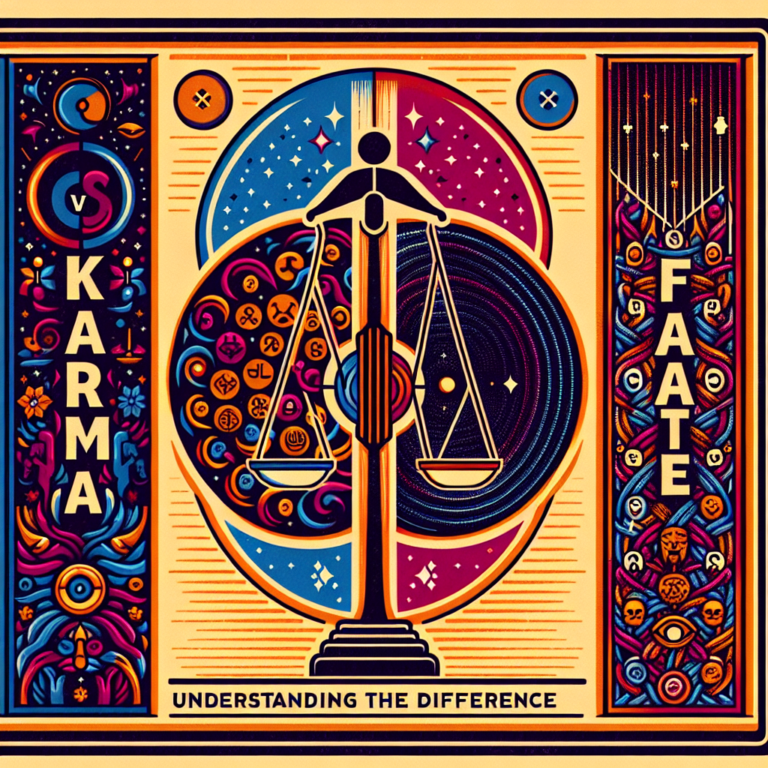Karma, derived from the Sanskrit word “karman,” means “action.” It is often simplified to mean “what goes around, comes around.” In many cultures and philosophies, karma embodies the principle of cause and effect, explaining how every action yields results, which can be positive or negative. This ancient concept is primarily associated with Hinduism and Buddhism but has permeated various modern philosophies and cultures, offering insights into human behavior and the consequences of our actions.
Understanding Karma: A Philosophical Perspective
The roots of karma are crucial to understanding its implications. In Hindu philosophy, karma is tied to the cycle of samsara (the cycle of birth, death, and rebirth) and forms an essential part of the ethical framework guiding human behavior. In Buddhism, karma is also significant; it emphasizes intention as a critical factor in determining the moral quality of an action. Thus, for Buddhists, the motivation behind an action is just as important as the action itself.
The Principle of Cause and Effect
The most straightforward understanding of karma revolves around the cause-and-effect relationship of our actions. When one engages in positive actions, such as kindness, compassion, and altruism, they can expect beneficial outcomes, whereas negative actions, such as cruelty, dishonesty, and selfishness, lead to detrimental results. This cyclical framework suggests that we are architects of our own destinies; our choices and actions have profound implications on our future experiences.
Karma and Moral Responsibility
Accepting the concept of karma requires acknowledging moral responsibility. Individuals are accountable for their actions and the consequences that arise from them. This accountability can foster a sense of empowerment. By understanding that our behavior influences our experience of life, we can consciously cultivate habits that result in more positive outcomes. However, moral responsibility should not lead to guilt; instead, it can serve as a guide for self-improvement and growth.
The Science Behind Karma: A Psychological Analysis
From a psychological perspective, the principles behind karma can also be illustrated through modern scientific theories about behavior and consequences. Research in psychology demonstrates how our actions shape our lives and how cognitive frameworks affect our understanding and execution of moral responsibility.
Cognitive Dissonance
Cognitive dissonance theory, developed by Leon Festinger in the late 1950s, explains how people experience discomfort when their beliefs about themselves do not align with their actions. For example, if someone perceives themselves as a kind person but acts selfishly, they might feel anxious or guilty. This discomfort can motivate the individual to change either their beliefs or their actions, focusing more on behaviors that align with their self-concept and values, similar to the principles of karma.
The Law of Attraction
The Law of Attraction further illustrates the connection between actions and outcomes. This concept, popularized by books and films like “The Secret,” posits that our thoughts and feelings attract similar circumstances and experiences into our lives. This suggests that a positive mindset can lead to positive actions and outcomes, aligning with the concept of karma—where positive actions, thoughts, and emotions yield beneficial results.
Social Learning Theory
Albert Bandura’s Social Learning Theory emphasizes the role of observational learning, imitation, and modeling in behavior. It illustrates how behaviors are learned through observing others and seeing the consequences of their actions. When individuals witness positive outcomes resulting from altruistic and kind actions, they are more likely to replicate these behaviors themselves, perpetuating a cycle of positive karma that benefits both the actor and the community.
The Manifestation of Karma in Everyday Life
Karma isn’t just a theoretical concept; it manifests in our daily lives in ways we might not always recognize. Observing how relationships, experiences, and personal growth unfold can provide insight into the workings of karma.
Relationships and Social Interactions
Our interactions with others significantly embody karmic principles. Acts of kindness, support, and authenticity often foster trust, gratitude, and closeness in relationships. Conversely, negative actions such as betrayal or unkindness can result in conflicts, isolation, and emotional pain. As individuals cultivate positive behavior, it tends to ripple through their social circles, encouraging an environment of support and mutual respect.
Health and Well-Being
Positive actions can also influence one’s health and well-being. Studies have shown that individuals engaged in compassionate activities experience lower levels of stress, increased mental well-being, and even physical health benefits. By performing acts of kindness, such as volunteering or helping others, people can enhance not only their happiness but also their overall quality of life, creating a positive feedback loop correlating to karma.
Personal Growth and Development
Karma is fundamentally linked to personal growth and self-improvement. By recognizing the consequences of one’s actions, individuals can learn from their experiences. Constructive reflection leads to better decision-making and promotes a lifecycle of learning and growth. This growth aligns with the ideal of karma, where the consequences of actions can lead to greater understanding and wisdom.
Addressing Misconceptions About Karma
While the concept of karma has beneficial insights, several misconceptions can obscure its understanding. Addressing these can help clarify its true significance.
Karma is Not Punishment
A common misconception is that karma serves as a form of punishment for bad deeds. In reality, karma is not a judgment meted out by an external force but rather a natural law of cause and effect. It’s essential to understand that negative outcomes are not solely punitive; they can merely reflect the results of one’s previous actions and decisions.
Not Everything is Karma
Another misunderstanding is that all adversities and misfortunes can be attributed directly to personal karma. While some experiences may stem from past actions, many factors in life—environmental influences, chance, and societal issues—contribute to individual experiences. Thus, it’s crucial to apply personal accountability without overgeneralizing that all experiences result purely from previous karma.
Karma is a Long-Term Process
Lastly, karma is sometimes viewed as an instantaneous process where actions quickly yield consequences. However, this is often not the case. The effects of actions may take time to manifest, and people may not always connect their current circumstances with past actions. Understanding karma requires patience and a broader perspective on the temporal nature of consequences.
The Role of Intention in Karma
Intention is a cornerstone in the philosophy of karma and serves as a differentiating factor among actions. The motivation behind an action shapes its moral quality and subsequent consequences.
Intention in Buddhist Philosophy
In Buddhist teachings, intention (cetana) is fundamental to understanding karma. According to the Buddha, every volitional act is driven by intention and, therefore, defines the moral quality of that action. Positive intentions lead to positive karma, while negative intentions yield adverse results. This focus emphasizes that it is not simply the action itself but the purpose and mindset behind it that matter.
Implications of Good Intentions
While having good intentions is crucial, it is equally essential to recognize that actions still bear consequences. One may intend to help but cause harm due to a lack of understanding or skill. Thus, coupling intent with wisdom and knowledge is vital to fulfilling meaningful actions that positively impact outcomes.
Practical Applications of Karma in Modern Life
Integrating the principles of karma into daily living can enhance one’s life experience and contribute to personal well-being and the well-being of others. Here are some practical ways to apply the concept of karma:
Mindful Actions
Practicing mindfulness encourages individuals to be aware of their thoughts, motivations, and behaviors. Mindful actions foster a deeper understanding of the potential consequences of one’s choices, ultimately leading to more intentional and positive behaviors.
Acts of Kindness
Engaging in regular acts of kindness, whether through volunteering, offering compliments, or simply being present for others, reinforces positive social connections and contributes to a more compassionate society.
Gratitude Practice
Fostering a sense of gratitude shifts the focus from negative experiences to the positive aspects of life. This practice enhances well-being and can lead to a more optimistic outlook, ultimately influencing behaviors that yield positive karma.
Self-Reflection
Regularly reflecting on actions, motivations, and their impacts promotes personal growth. Introspection allows for learning from past behaviors and helps individuals make conscious decisions moving forward.
Conclusion
The science of karma offers valuable insights into how our actions shape our lives. By understanding karma as a principle of cause and effect, individuals can grasp the significance of their decisions and behaviors. It underscores the importance of moral responsibility, the impact of intentions behind actions, and the profound ways that our actions ripple through our relationships and overall well-being.
While addressing the misconceptions surrounding karma can deepen our understanding, it ultimately serves as a guiding principle for leading a life rooted in mindfulness, compassion, and growth. In a world where actions create reactions, embracing the concept of karma can empower individuals to cultivate positive behaviors, enriching not only their own lives but also those of others around them.
FAQs
What is karma?
Karma is the concept of cause and effect, where every action has consequences that affect an individual’s future experiences. It encourages moral responsibility and highlights the connection between actions and outcomes.
Is karma a punishment for bad deeds?
No, karma is not a form of punishment. It is a natural law of cause and effect. Negative experiences may result from past actions, but karma is not a judgment passed by an external entity.
Can karma be instant?
Karma is often a long-term process, and the consequences of actions may not be immediately evident. Understanding the implications of karma requires patience and a broader perspective on time.
Does intention matter in karma?
Yes, intention is a critical factor in determining the moral quality of an action. Positive intentions lead to positive karma, while negative intentions yield adverse results. It is essential to couple good intentions with knowledge and understanding.
How can I apply the principles of karma in my life?
You can apply the principles of karma by practicing mindfulness, engaging in acts of kindness, fostering gratitude, and regularly reflecting on your actions and their consequences.
Sure! What would you like to prompt me with? If you have a specific topic, question, or type of content in mind, feel free to share, and I’ll do my best to assist you!, #Science #Karma #Actions #Shape #Life, #Science #Karma #Actions #Shape #Life, 1736611370, the-science-of-karma-how-your-actions-shape-your-life





